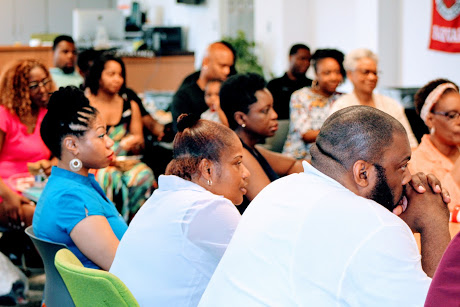Since Innovation Works launched last year, it has brought resources like accelerator programs and mentorship around social entrepreneurs working on new models that bring both impact and economic contributions in the Baltimore neighborhoods.
In making connections to a network and offering guidance, the programming was designed specifically to tackle the factors behind the racial wealth divide, and access gaps that have long made it difficult for entrepreneurs working in the city’s neighborhoods that have long been underserved, particularly women and people of color.
It’s all toward a goal of creating 250 social enterprises over the next decade.
“If we can help these entrepreneurs succeed, they are going to cont to change the economic footprint of neighborhoods that are currently struggling,” Innovation Works CEO A. Jay Nwachu said.
Yet when it comes to helping companies with a foundation grow their models, there’s another reality that said needs to be confronted: “Without access to capital, we’re simply setting them up for failure, and we need to bridge that gap,” he said.
So this year, the organization is launching a new fund to get early-stage capital to social entrepreneurs. Ignite Capital, a $4 million fund, is looking to provide the funding that can work alongside continued mentorship and other resources Innovation Works offers to help entrepreneurs build sustainable models.
We need a new model for investing in these communities that is not solely grants.
Coming in the form of small grants, lending and equity funding that is mostly less than $100,000, the funding will serve as “patient capital,” Nwachu said. With more than $2 million raised so far, the fund is designed to offer a longer-term investment, and have low interest rates. The social enterprises can be pre-revenue, and the model doesn’t require an entrepreneur to give up equity, though that could be an option in one type of funding it offers.
The rise of social enterpreneurship has brought the need for experimentation in funding. Some ventures in this category are nonprofits, which tend to attract grants that are not designed to align with the time it takes to develop a new model. Other ventures are for-profit, and building an impact model doesn’t always fit with a venture capitalist’s focus on returns (though it certainly can), or on specific industry verticals. There are structural disparities at play, as women and people of color receive far less funding than white, male entrepreneurs. And Black entrepreneurs, in particular, are more likely to lack access to the “friends and family” round of funding that helps the startups that one might find in a local incubator through the earliest stages.
“We need a similar effort that has gone into those spaces [like incubators] to go into neighborhoods and small businesses in places that we don’t look at every day, and we need a new model for investing in these communities that is not solely grants,” Nwachu said.
Ignite Capital shows a model that is built to address these issues, and help the entrepreneurs who are in turn building new approaches to addressing systemic ills.
It aims to support 12 businesses a year, and so far has deployed $252,000 into four social enterprises:
- Parity, founded by Bree Jones, aims to give legacy residents in disenfranchised communities a seat at the table in their own community’s redevelopment, as Technical.ly previously reported.
- Lifting Labels, founded by Chester France, aims to combine workforce development and entrepreneurial training for returning citizens making robes.
- Infinite Focus Schools, founded by Ashley Williams, built a learning platform with mindfulness and socio-emotional curriculum.
- SewLab USA, founded by Cecilia Grimm, is a manufacturing company that creates soft goods from sustainable materials, such as face masks.
Led by Nwachu along with fund coordinator Gregory Hunter, the Innovation Works team recommends social enterprises for investment based on meeting five specific milestones as they progress through programming. The entrepreneurs are then interviewed by an investment committee that includes Patti Chandler, VP of finance and administration at Baltimore Community Foundation; Chris Grant, investment manager for Blueprint Local; former Inovalon CIO Dan Rizzo; Early Charm Ventures founder Ken Malone; Parity’s Jones; and Nwachu.
Ignite Capital also has a co-investor network that is comprised of individuals, companies and foundations that can provide capital alongside the fund. The goal is to bring along other investors who wouldn’t typically be in this early, or investing in a social enterprise.
In all, Ignite Capital can help to “de-risk” companies that others might look to invest in, Nwachu said. It is designed to allow space for a model to help entrepreneurs attract additional investors or access other forms of capital.
Along with the funding, social enterprises can also continue to tap into Innovation Works’ network. They are assigned a mentor, and all four of the companies that received funding are getting access to accelerator programming via the Miller Center for Social Entrepreneurship at Santa Clara University, with which Innovation Works is partnered.
The big hurdle was getting some initial capital to get started, and that is what we have now. Ignite Capital has been the linchpin for that to happen.
The approach appeals to Infinite Focus Schools’ Willams. Over two years, the founder worked to develop and iterate a platform that offers a video and data-based curriculum for mindfulness and socio-emotional learning. Now it’s looking to develop more brand awareness in the market as it seeks to reach individual teachers and parents, and the funding will help that effort.
“It’s pushing us forward at the perfect time,” she said.
Williams said she believes the model of Innovation Works and Ignite Capital is “helping the whole entrepreneur — not just the company but the mental well-being of the entrepreneur.” And it’s also helping the company beyond just providing funding.
“This is a holistic approach which aligns with our vision,” she said. “We’re all about the healthy, whole child.”
Lifting Labels’s France sees opportunity for sewing skills taught to people while incarcerated to lead to jobs after release, as well. With his company, the longtime prison chaplain is developing a model where returning citizens will start worker-owned co-ops to make clothing for religious settings and clergy, such as choir robes.
Though he has a business background with an education from Morgan State University and more than 25 years in corporate roles, France said finding funding to get the operation off the ground has been a challenge. But after meeting Nwachu, he was accepted into Innovation Works’ cohort for a three-day Boost program, and soon after he pitched at Open Works’ business plan competition.
“He saw the potential of the vision and what it could mean down the road in terms of creating jobs for a particular population that not a lot of people are paying attention to, particularly in Baltimore,” France said of Nwachu.
With funding from Ignite Capital, France said he can start the process of obtaining the equipment. He’ll continue raising funds toward creating prototypes and hiring and training five people.
“The big hurdle was getting some initial capital to get started, and that is what we have now,” France said. “Ignite Capital has been the linchpin for that to happen.”
Join the conversation!
Find news, events, jobs and people who share your interests on Technical.ly's open community Slack

Baltimore daily roundup: The city's new esports lab; a conference in Wilmington; GBC reports $4B of economic activity

Baltimore daily roundup: Find your next coworking space; sea turtle legislation; Dali raided and sued

Baltimore daily roundup: Johns Hopkins dedicates The Pava Center; Q1's VC outlook; Cal Ripken inaugurates youth STEM center


